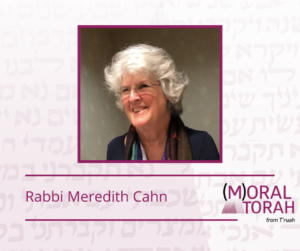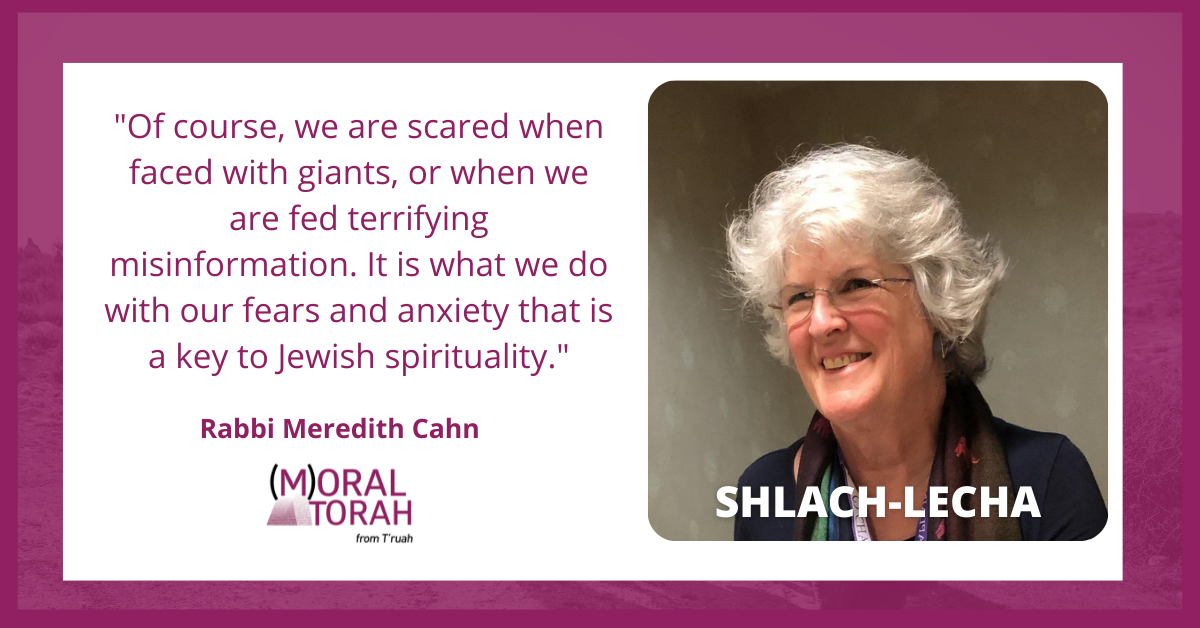A D’var Torah for Parshat Shlach-Lecha by Rabbi Meredith Cahn
In June 2017, the podcast Radiolab did an episode about a man whose brain surgery for seizures led him to have voracious appetites — food, sex, and finally child pornography. He was arrested and tried in court. While awaiting trial, newly prescribed medication curtailed all those appetites. The defense argued that this proved it was a brain/physical issue. The prosecution responded that since the man controlled himself at work, it was a choice. On the podcast, Stanford evolutionary biologist Robert Sapolsky argued that this was just wrong; that the focus should not be on free will but on fear. He spoke about the role fear plays in the lives of monkeys and in our lives. Fear will stop us in our tracks. Male bonobos may want to mount any female in proximity but won’t go near the alpha male’s females. A person will interrupt an obsession during working hours over the risk of losing their livelihood.
As I listened to Sapolsky, I thought this concept applies to so much of our Torah: How much fear of plague or curses or just the wrath of our “slow-to-anger” God was meant to lead us on the path of righteousness?
Sign up to receive (M)oral Torah in your inbox each week.
And here in Shlach-Lecha, we find the people in a complete tizzy of fear. “Giants!” Ten of the scouts tell the people. We appeared as grasshoppers to ourselves! How can we succeed? Not even God could save us!
The mass hysteria that followed led the people to want to go back to the “safety” of Egypt, where they had so recently been enslaved to Pharaoh.
Recently, I’ve been thinking about all the ways people operate out of fear: for example, white fear of being “replaced” by Black people and people of color, and men’s fear of women’s sexuality.
The recent shootings in Buffalo, Laguna Woods, Tulsa, Uvalde (and so many more that are not reported on — 123 people die each day in the U.S. as a result of guns) and the seeming inability to do anything to stop it highlight a particular fear aroused in a segment of our population. This fear is one of people who are afraid “they are coming for your guns,” that they will lose freedom. The people — elected officials, media voices — who are misleading and inducing fear in the public might very well descend from the scouts who were princes of their tribes. A grimmer analogy also comes to mind: They are like the biblical worshippers of Moloch, willing to sacrifice children, this time to the great god, the Second Amendment.
Find more commentaries on Parshat Shlach-Lecha.
So what do we do? What does the Torah teach us here? I think Caleb and Joshua’s message (Numbers 14:9) is clear: “Al tira!” Have no fear; trust in God; listen to God.
Of course, we are scared when faced with giants, or when we are fed terrifying misinformation. It is what we do with our fears and anxiety that is a key to Jewish spirituality. Can we quiet our amygdalas and let our frontal lobes — our higher selves — come back online? Can we put a space between the match and the flame, as spiritual teacher Alan Morinis would tell us?
 It is hard not to be afraid, as we are reminded when we sing Rebbe Nachman’s Kol HaOlam Kulo. But this parshah might also offer us a spiritual resource for combating fear. Remember that while we might feel like grasshoppers, we are fully realized human beings. We can make choices that lead us back to the Promised Land, the place where our children are cherished, our teachers respected, and lives are sacred. We know fear is a feeling we can choose to set aside, while we work to make that Promised Land come into being.
It is hard not to be afraid, as we are reminded when we sing Rebbe Nachman’s Kol HaOlam Kulo. But this parshah might also offer us a spiritual resource for combating fear. Remember that while we might feel like grasshoppers, we are fully realized human beings. We can make choices that lead us back to the Promised Land, the place where our children are cherished, our teachers respected, and lives are sacred. We know fear is a feeling we can choose to set aside, while we work to make that Promised Land come into being.
Rabbi Meredith Cahn, a graduate of AJR-CA, serves as a hospital, hospice, and eldercare chaplain in Sonoma County, CA, where she lives with her husband, daughter, grandson, cat, and dog.
Photo credit: Jill Schneider

